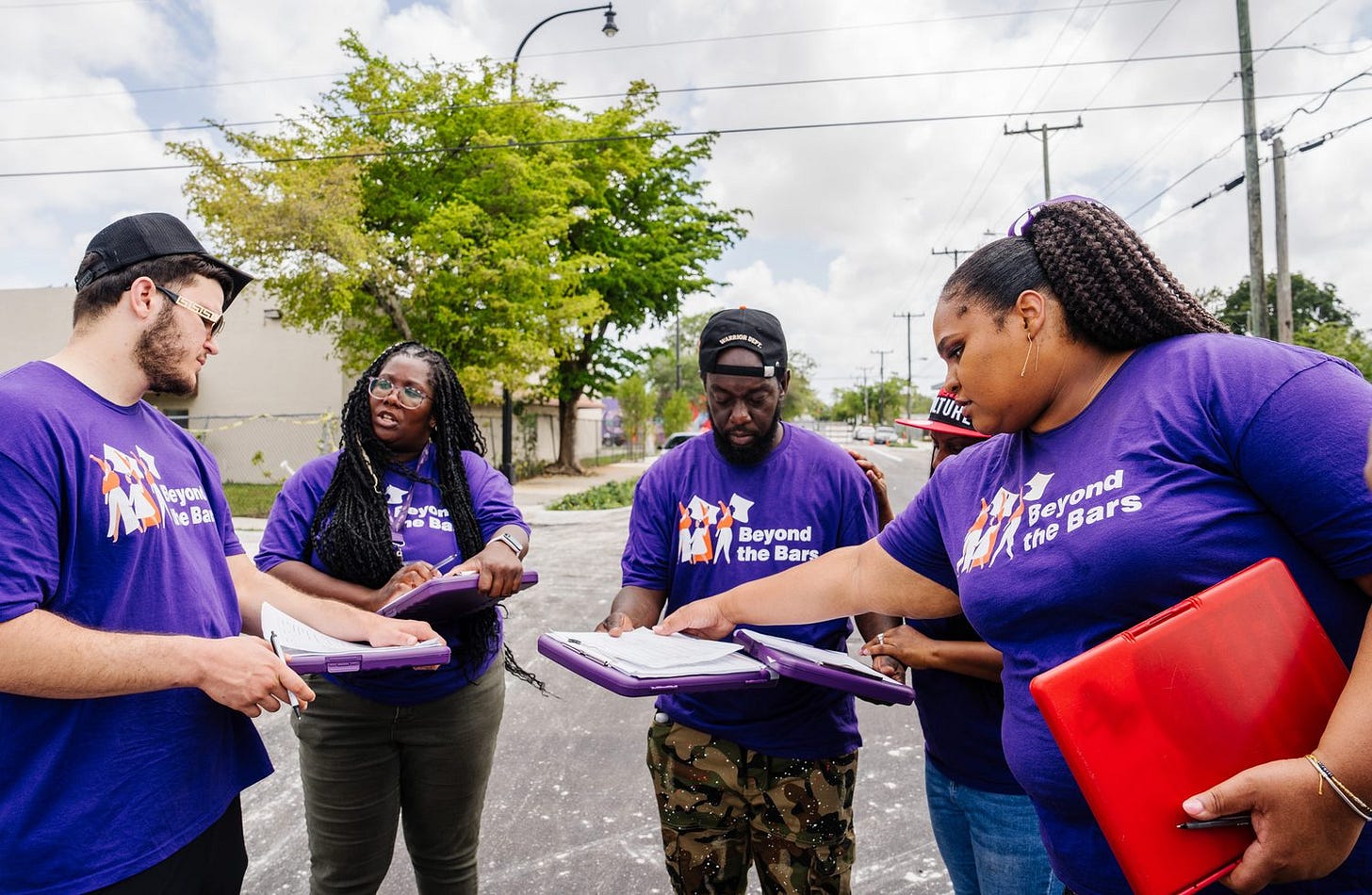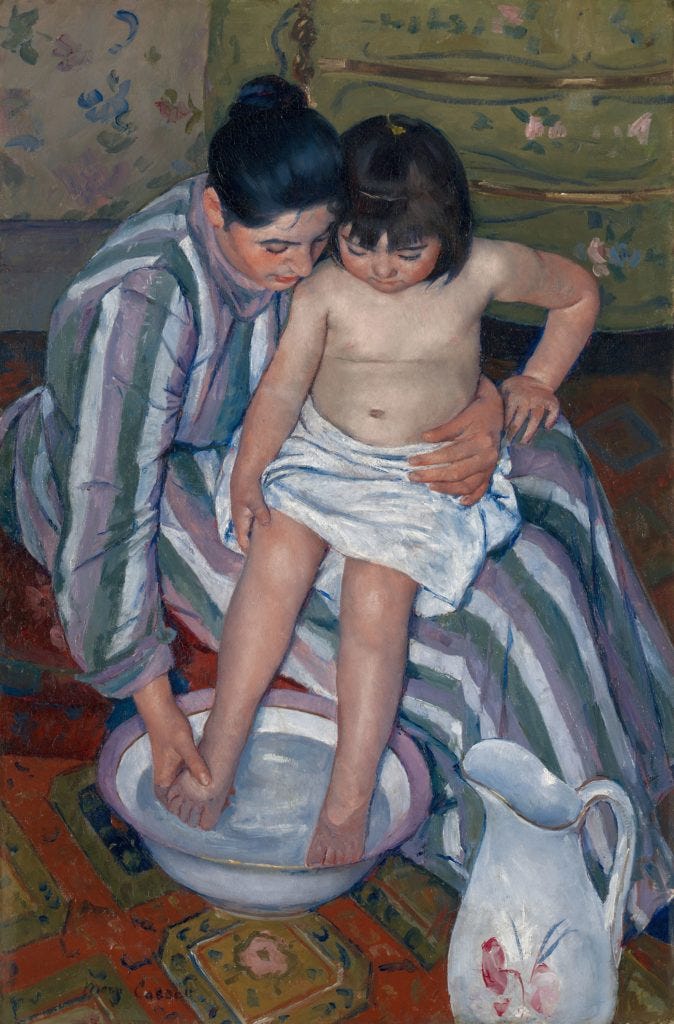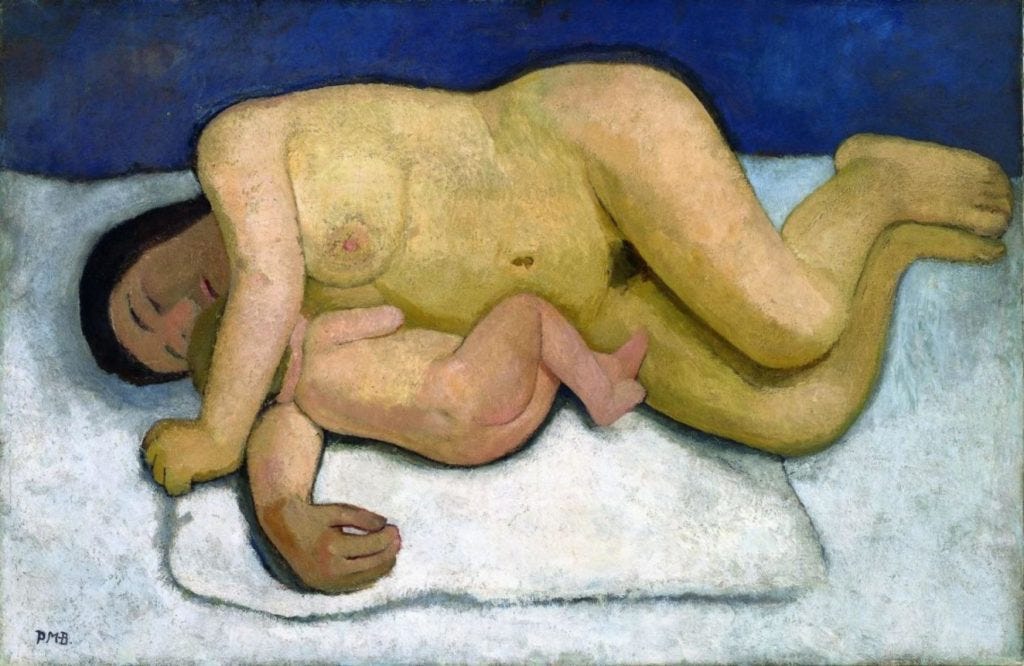In today’s letter: Updates on Australian politics, women’s climate needs in Sri Lanka, a US labour organizer of the year, a book honouring Gucci’s silk scarves, sea sponges can actually move, tariff effects in Lesotho, how to get people to perceive climate change as urgent and disruptive, and much more.
The weekend passed in a flash—two book clubs, a baby shower, Mother’s Day lunch, and the world’s largest fair trade dinner party later, I feel as though I barely saw the inside of my apartment after Friday morning. But that’s not a complaint. Life is far too short to spend it continually indoors. It was a lot of socializing, which I love, but I’m craving a couple of quieter nights in this week to rest and reset before heading to New York for a long weekend on Thursday.
What struck me most over the past few days wasn’t just the number of events, but the people—the overlapping of circles, the unexpected connections, the moments of conversation where you realize your world is quietly, beautifully expanding. There’s something especially heartening about watching the web of your life take shape, when friends from different corners start to meet and mingle, forming new bonds of their own. It’s one of my favorite phenomena: a kind of social alchemy, where shared ideas, interests, and warmth begin to stitch people together into something resembling community.
It reminded me that while solitude can be restorative, connection is equally essential to a well-rounded life. These spontaneous intersections, the chance to witness friends delight in one another’s company, to gather around food or stories or shared values—that’s the real gold. And though I’m looking forward to a few slow evenings this week, I’m also holding onto the joy of the last few days: the fullness, the laughter, and the quiet, affirming knowledge that a life thoughtfully lived is one where the rooms are always full, in one way or another.
I’d love to know—what’s your version of a full, satisfying weekend? Is it packed with plans or grounded in quiet rituals? When do you feel most alive? Hit reply and let me know.
A quiet but calculated campaign is gathering steam in the US as anti-abortion activists rally behind “Rolling Thunder,” a coordinated push to pressure the FDA to reimpose restrictions on mifepristone, the widely used abortion medication approved over two decades ago. Behind the scenes, conservative strategists are mobilizing legal challenges against telehealth providers, lobbying for tighter regulations, and amplifying a controversial new report claiming the drug poses significant health risks, despite decades of rigorous safety data. The report, published by the Ethics and Public Policy Center and based on unverified insurance claims, has been widely dismissed by reproductive health experts, but it has already spurred legislative action from figures such as Senator Josh Hawley. The Trump administration’s position remains ambiguous: while signaling procedural objections to Republican-led legal challenges (I wrote about last week), it has stopped short of defending the drug’s safety and left the door open to future restrictions. With telemedicine abortion now the most common method of terminating pregnancies in the US, especially in the wake of Roe v. Wade’s reversal, any shift in federal policy could have sweeping implications, even in states where abortion remains legal. Anti-abortion leaders, meanwhile, are clear-eyed about their endgame: Rolling Thunder is merely the opening act in a longer effort to eliminate mifepristone altogether.
Ali France, the Labour candidate who unseated Peter Dutton in Australia’s 2025 federal election, made history by claiming the seat of Dickson from the long-serving opposition leader. Dutton, who held the seat for 24 years, became the first federal opposition leader to lose his own seat. France, 49, a former journalist, communications manager, and para-athlete, had long been chipping away at Dutton’s stronghold. Her platform focused on reducing the cost of living, cutting taxes, lowering medicine costs, expanding paid parental leave, and improving healthcare and education. Inspired by her own experience as a disabled mother following a 2011 accident that resulted in the amputation of her leg, France has been a steadfast advocate for people with disabilities. Her victory comes on the heels of personal tragedy: her eldest son, Henry, died from leukaemia in 2024. France’s poignant message to Sky News after her win captured the bittersweetness of her journey: "Life’s bittersweet, isn’t it? It is a series of highs and lows."
In Sri Lanka’s Northern Province, as temperatures soar, women in industries like cashew processing and seaweed farming are bearing the brunt of the climate crisis—enduring intense physical strain, economic instability, and rising health risks with little support or recognition. Despite their vital contributions to local economies, these women are largely excluded from climate planning, revealing a dangerous gap in current adaptation strategies. Without gender-responsive policies that account for their lived realities, community resilience remains fragile. Equipping these women with climate-smart tools, investing in their leadership, and integrating their insights into policymaking isn’t just just—it’s critical to forging durable, inclusive responses in a warming world.
Katherine Passley, co-leader of Beyond the Bars, has been recognized as one of In These Times’ 2025 Labour Organizers of the Year for her pivotal role in creating the first worker center in the U.S. dedicated to individuals with criminal records and their families. Born out of necessity during the pandemic when Passley sought to protect her incarcerated father, the organization began as a small Zoom group and has since secured impressive victories, including eliminating $10 million in jail fees and reducing over $100 million in jail debt, benefiting 60,000 families annually. Passley, a legal psychology PhD candidate with experience in law enforcement and domestic violence advocacy, leads with both academic insight and lived experience. Beyond the Bars fosters a deeply communal approach, offering bilingual meetings with Cuban food, childcare, and legal workshops, while advocating for systemic reforms like ending exploitative temp labour practices. The organization’s work is grounded in solidarity, mutual aid, and radical kinship, as every staff member is personally impacted by incarceration. “We’re not just theorizing reentry,” Passley says. “We’re building a political economy where people demand dignified work—and learn to lead.” With national collaborations and bold research initiatives, Beyond the Bars is shaping a more inclusive labour movement that doesn’t just welcome returning citizens but empowers them to thrive.

England’s roofs are getting a makeover: come 2027, every newly built home must sport solar panels, tacking an extra £3–4 k onto build costs but shaving off over £1 k from annual energy bills. With loans and grants in the pipeline to retrofit the existing housing stock, Keir Starmer is doubling down on net zero—proof that solar is now standard issue, not optional glitz. Even Tony Blair’s climate scepticism couldn’t eclipse this sunlit policy shift.
A new study from Princeton and Carnegie Mellon suggests that the key to cutting through climate apathy lies in simplicity. When data is presented in stark terms (like whether a lake froze or didn’t), people are far more likely to perceive climate change as urgent and disruptive. Grace Liu, whose research began with a local tradition of skating on a now-thawing Lake Carnegie, found that binary visuals triggered stronger emotional reactions than gradual graphs. This method of storytelling—what’s gone missing, rather than what’s slowly shifting—brings clarity to an issue often drowned in complexity. If science is to prompt action, it may need to trade precision for immediacy, offering the public not just numbers, but a sense of loss they can feel.
Hawaii has just become the first US state to slap a “green fee” on tourists, an extra 0.75 percent on hotel stays (11 percent on cruise bills), to generate about $100 million annually for climate defence. Governor Josh Green hails it as a small price to pay for beach replenishment, roof reinforcements, and wildfire prevention, arguing that visitors will gladly chip in to safeguard the very isles they’ve come to adore.
Far beneath the frigid North Atlantic, scientists aboard the Polarstern research vessel captured an unassuming smear on the seafloor—evidence that sea sponges, once thought immobile, are slowly but deliberately on the move. These ancient, brainless organisms, some of Earth’s oldest animals, are now recognized as critical bioengineers, quietly shaping marine ecosystems for over 600 million years. Found in nearly every oceanic habitat, sponges filter thousands of gallons of seawater daily, support biodiversity, stabilize seafloors, and even offer biomedical promise through their antiviral and regenerative properties. Their newfound mobility suggests a surprising adaptability: inching progress that may aid feeding, reproduction, and survival in changing environments. As climate shifts accelerate, these humble creatures could prove unexpectedly resilient, moving, quite literally, at the forefront of oceanic change.

Alexandra Lange’s 2025 Pulitzer Prize for Criticism celebrates the work of a freelancer whose CityLab essays have deftly woven the rigours of design critique into the broader social fabric. Over the past year, Lange has turned her attention to the overlooked corners of urban life, from the importance of sunlit courtyards in fostering children’s mental health to the challenge of crafting museum exhibits that can outwit smartphone screens. Her writing, buoyed by thoughtful interviews and incisive analysis, reframes architecture as a lived experience—one that encompasses parenting, neurodiversity, and accessibility rather than a purely aesthetic discipline. Noting that she’s been “writing about childhood since I had my oldest son in 2007,” Lange insists that returning to the same theme can yield fresh insights, and the Pulitzer Board agreed, lauding her for an ability to make even seasoned observers reconsider how public spaces shape our youngest citizens.
A century of elegance, celebrity and craftsmanship is unfurled in Gucci: The Art of Silk, a new Assouline title that opens the maison’s storied scarf archive like never before. From botanical prints to equestrian motifs, the volume traces the evolution of fashion’s most iconic square. The book offers a window into the house’s silk ateliers, where meticulous hand-rolled hems and saturated hues define each piece. It also pays tribute to the muses who made them legendary—from Princess Grace to modern tastemakers. A tactile celebration of heritage and haute design, The Art of Silk reminds us why the Gucci scarf remains both collectible and utterly contemporary.
Trump’s proposed “reciprocal” tariffs are sending shockwaves through Africa’s garment and textiles sector—nowhere more so than in Lesotho, where a staggering 50% levy, second only to China’s, threatens the country's economic lifeline. In 2024, the U.S. imported $237 million in goods from the small southern African nation, while Lesotho brought in just $2.8 million in American exports. For Trump, the disparity signals unfair trade. For Lesotho—a country where 75% of the 2.3 million population lives in poverty or near it—it reflects a dependence on garment manufacturing as a pillar of survival, not a tilt in global commerce. The proposed tariffs risk triggering factory closures, job losses, and intensified strain on already fragile supply chains. Once hailed as a regional success story thanks to duty-free access to U.S. markets, Lesotho’s export economy now teeters on the brink. For a nation with limited natural resources, the garment industry has not just provided jobs but helped fund education, healthcare, and infrastructure—an ecosystem now under threat.
Paula Modersohn-Becker, a pioneering figure in early Expressionism, was among the first women artists to paint nude self-portraits—not as objects of spectacle, but as acts of quiet defiance and radical honesty. Her 1906 work, Reclining Mother and Child 11, distills maternal intimacy to its essence: no background, no adornment, just a monumental female figure curled protectively around her child in a primal gesture of warmth and care. Stripped of time and place, the painting speaks to something ancient and immediate, sensual yet unsexual, profoundly human. Though she sold only three paintings in her lifetime, Modersohn-Becker produced an extraordinary body of work before her untimely death at 31, just days after giving birth to her daughter. “I am becoming something,” she wrote shortly before she died. She was. And in many ways, still is.
Thank you for reading! Please share with an interesting and interested person in your life. xxx






